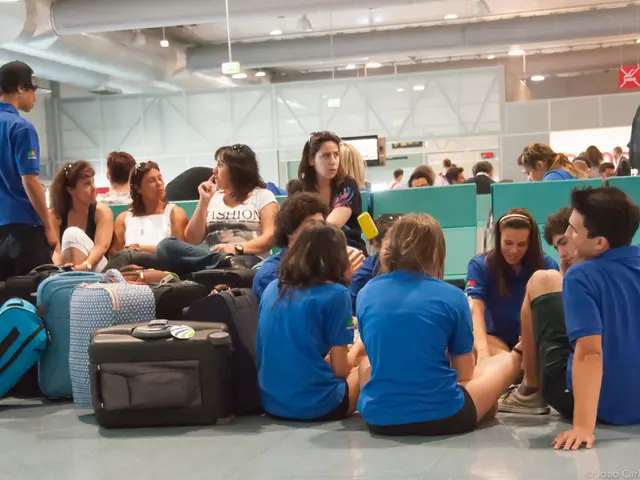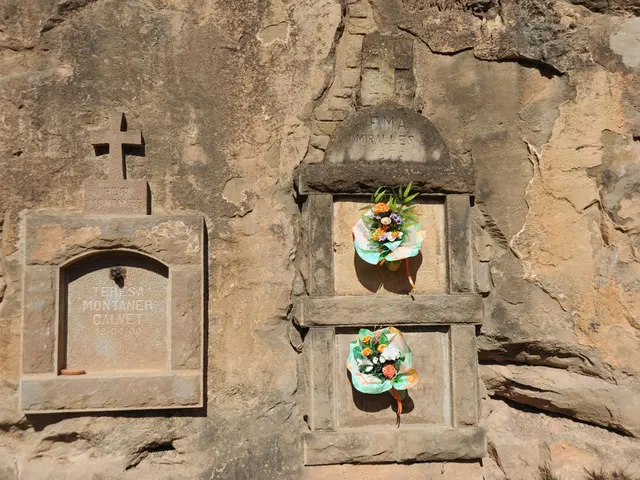Rapid Expansion in Tourism Sectors Highlighted by Kazakh Government Authority, Emphasizing Necessary Enhancements
Catching the Eye of High-Spending Travelers: A Peek at Kazakhstan's Growing Tourism Landscape
Astana, Kazakhstan - Tourism is swiftly making its way up the nation's economic priority list. In an interview with Kazinform, Deputy Minister of Tourism and Sports, Yerzhan Yerkinbayev, discussed the industry's growth and future plans. Here's a sneak peek into Kazakhstan's pursuit of attracting high-rolling travelers and developing premium tourism products, especially focusing on ski and eco-tourism.
Photo credit: gov.kz
Yerkinbayev spoke about the introduction of the Neo Nomad Visa in Kazakhstan earlier.
Rising Industry Indicators
In the first nine months of 2024, domestic tourism observed a significant surge, with nearly 10.5 million people taking vacations, which is approximately a million more than the previous year. Foreign visitors numbered 15.3 million, including 10.4 million who stayed beyond 24 hours. Total spending reached a whopping $2.7 billion, with sector investments skyrocketing by 20% from 2023 to 948 billion tenge (US$1.9 billion). In addition, 100 new hotels were opened, and hotel revenues soared by 27%.
More than half a million people work in the tourism sector, and the workforce continues to grow by 5-8% each year. Tourism also contributes approximately 500 billion tenge (over US$1 billion) to the nation's budget annually, with taxes growing 25% each year.
Charting the Course: Problem-Solving and Strategy for Success
An issue that continues to challenge Kazakhstan is accounting for foreign tourists. Statistical data suggests that only one million out of ten million visitors stayed in hotels, indicating the potential existence of a hidden rental market. To gain a clearer understanding of tourist preferences and maximize economic benefits, Kazakhstan is poised to introduce new statistical and regulatory measures.
Plenty of cities experience both benefits and strains from tourism. Yerkinbayev acknowledged the negative effects of overtourism, such as pressure on the environment, infrastructure, and transportation systems, as seen in cities like Barcelona and Milan. To strike a balance between tourism growth and minimizing these impacts, Kazakhstan plans to lure high-spending travelers and develop premium tourism products.
Skiing Down the Mountain and Stepping into the Wild
One major focus is the development of ski tourism. The Almaty region presents ideal conditions with a lengthy winter season, high-quality snow, and a convenient airport just 30 minutes from the ski slopes. A comprehensive plan is underway to interlink the Shymbulak and Oi-Qaragai resorts, resulting in 140 kilometers of trails and thousands of job opportunities. This project is slated to be completed by 2029.
Eco-tourism is also a key priority. Yerkinbayev plans to establish infrastructure in major cities, villages, and national parks to cater to an increasing number of travelers seeking unique and authentic experiences. In an intriguing twist, the government is preparing legislative amendments to allow tourism on agricultural lands without altering their purpose.
"Imagine farmers collaborating with their neighbors, offering beekeeping tours and horseback riding adventures. This would create several new jobs for locals. My dream is for everyday citizens to reap the benefits and income from tourism," Yerkinbayev shared.
Growing Infrastructure, Accessibility, and Promotion
Infrastructure development, including roads, power grids, and water supply, plays a crucial role in facilitating tourism growth. City and regional governments have been granted the authority to construct utility networks within national parks without encroaching on protected lands. The Imantau-Shalkar resort area has already undergone enhancements.
Transport accessibility continues to be a significant concern. However, the situation is gradually improving, with Kazakhstan acquiring 113 new railway carriages in 2023, 143 more in 2024, and expectations of 226 additional carriages in 2025. Additionally, 22 new routes were added in 2024, including flights to Shanghai, Xi'an, Rome, Budapest, Delhi, Munich, Seoul, and more.
Marketing and Moving Mountains
Kazakhstan's tourism promotion budget is approximately $1 million yearly, a figure significantly lower than that of competitors such as Azerbaijan, which dedicates around $32 million on marketing, excluding major sports event expenditures. Kazakhstan concentrates on investing in infrastructure development, exclusive tourism experiences, and targeted marketing.
Yerkinbayev stated, "Undoubtedly, broadcasts about Kazakh snow leopards on international TV screens and exhibits of our stunning landscapes and modern cities in the world's largest airports would be incredible. However, we prioritize attending essential sites and travel expos, bringing our tour operators to target markets and signing partnerships, knowing that our marketing investments will yield immediate benefits for the nation, at least ten times over."
[2]:https://www.africa-intelligence.com/ Database/Country/Kazakhstan/Tourism/Article/Visa-free-access-for-88-countries-and-citizens-with-a-consec/
- To boost tourism, Kazakhstan is considering introducing a new legislative measure that allows tourists to engage in activities on agricultural lands, potentially creating new job opportunities for local residents.
- As part of its strategy to attract high-spending travelers, the country is focusing on developing premium tourism products, with a particular emphasis on ski and eco-tourism, and investing in infrastructure and targeted marketing.








